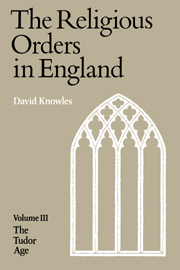Book contents
- Frontmatter
- Contents
- Preface
- List of Abbreviations
- Part One The Tudor Scene
- Chap. I The reign of Henry VII
- Chap. II Some monastic activities
- Chap. III The Cistercians
- Chap. IV The Premonstratensians
- Chap. V The friars in the early sixteenth century
- Chap. VI Sixteenth-century visitations
- Chap. VII Monastic personalities
- Chap. VIII Humanism at Evesham
- Chap. IX William More, prior of Worcester, 1518–36
- Chap. X Butley and Durham
- Part Two The Gathering Storm
- Part Three Suppression and Dissolution
- Part Four Reaction and Survival
- Appendix I Sir Thomas More's letter ‘to a monk’
- Appendix II Religious houses suppressed by Cardinal Wolsey
- Appendix III The witness of the Carthusians
- Appendix IV Houses with incomes exceeding £1000 in the Valor Ecclesiasticus
- Appendix V The sacrist of Beauvale
- Appendix VI Itinerary of the visitors, 1535–6
- Appendix VII The commissioners for the survey of the Lesser Houses in 1536
- Appendix VIII The conflict of evidence on the monasteries
- Appendix IX The last abbots of Colchester, Reading and Glastonbury
- Appendix X Regulars as bishops
- Bibliography
- Index
Chap. V - The friars in the early sixteenth century
Published online by Cambridge University Press: 08 January 2010
- Frontmatter
- Contents
- Preface
- List of Abbreviations
- Part One The Tudor Scene
- Chap. I The reign of Henry VII
- Chap. II Some monastic activities
- Chap. III The Cistercians
- Chap. IV The Premonstratensians
- Chap. V The friars in the early sixteenth century
- Chap. VI Sixteenth-century visitations
- Chap. VII Monastic personalities
- Chap. VIII Humanism at Evesham
- Chap. IX William More, prior of Worcester, 1518–36
- Chap. X Butley and Durham
- Part Two The Gathering Storm
- Part Three Suppression and Dissolution
- Part Four Reaction and Survival
- Appendix I Sir Thomas More's letter ‘to a monk’
- Appendix II Religious houses suppressed by Cardinal Wolsey
- Appendix III The witness of the Carthusians
- Appendix IV Houses with incomes exceeding £1000 in the Valor Ecclesiasticus
- Appendix V The sacrist of Beauvale
- Appendix VI Itinerary of the visitors, 1535–6
- Appendix VII The commissioners for the survey of the Lesser Houses in 1536
- Appendix VIII The conflict of evidence on the monasteries
- Appendix IX The last abbots of Colchester, Reading and Glastonbury
- Appendix X Regulars as bishops
- Bibliography
- Index
Summary
The seventy years that followed the death of the eminent Carmelite apologist, Thomas Netter of Walden (ob. 1430), make up the darkest period in the history of the English friars. Chronicles, biographies, literary work, and even theological treaties are lacking, and the fairly plentiful record material does little but tell us of the ordinations and academic successes of the friars, together with an enumeration of legacies appearing in the wills of townspeople all over England. By a significant coincidence, the two scholars who have devoted most labour to investigations in the sources of Franciscan and Dominican history use the same metaphor of sleep to describe the state of the two bodies of friars in the fifteenth century.
Throughout the period, indeed, a small number of friars of both orders continued to be appointed to Welsh bishoprics, or to serve as suffragans to diocesans in England, but none of these made any great mark either before or after episcopal consecration. At Oxford the great controversy with the Lollards had died away, and no new crisis developed in which bishops might feel the need of a panel of expert theologians; although the Carmelite provincial, John Milverton, took a hand in the early stages of the affair of Reginald Pecock, the final trial was a matter for politicians rather than for theologians. At the universities it was an age of routine, if not of decadence, in philosophy and theology, and with the foundation of numerous colleges the friars lost the pride of place that had once been theirs, and became only a group among the components of the academic body.
- Type
- Chapter
- Information
- The Religious Orders in England , pp. 52 - 61Publisher: Cambridge University PressPrint publication year: 1979



